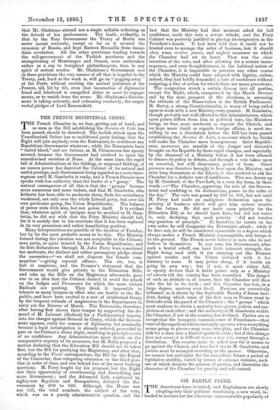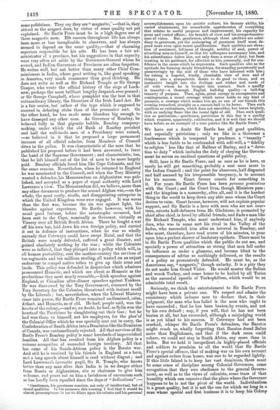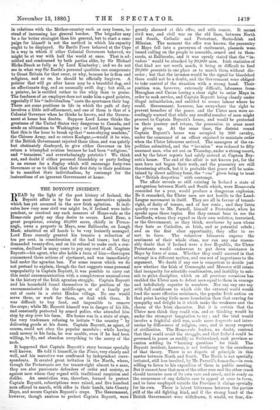SIR BARTLE FRERE.
THE Americans have invented, and Englishmen are slowly adopting into their political vocabulary, a new word, in- tended to account for the otherwise unaccountable popularity of some politicians. They say they are " magnetic,"—that is, they, attract as the magnet does, by virtue of some quality not yet explained. Sir Bartle Frere must be in a high degree one of these magnetic men. His success throughout life has always been more or less inexplicable to observers, and has always seemed to depend on the same quality,—that of charming superiors responsible for his acts. He has been a fair ad-. ministrator of a province, but his suggestions in that capacity were very often set aside by the Governors-General whom he, served, and Indian Governors of Provinces are often forgotten. He writes well, but not better than many other Chief Com- missioners in India, where good writing is, like good speaking in America, very much commoner than good thinking. He does not write as well as Sir Richard Temple or Sir George Couper, who wrote the official history of the siege of Luck- now, perhaps the most brilliant lengthy despatch ever penned; or Sir George Campbell, whose pamphlet was the best in that .extraordinary library, the literature of the Irish Land Act. He is a fair orator, but rather of the type which is supposed to succeed in debating clubs than of the persuasive sort. On the other hand, he has made some blunders big enough to have damaged any other man. As Governor of Bombay, he believed fully in that gigantic bubble, Bombay company- making, under which the old Bank of Bombay perished and half the well-to-do men of a Presidency were ruined, --iso believed in it that he proposed a large permanent increase of all official salaries, from Members of Council ,ddwn to the police. It was characteristic of the man that he. -published his proposal before it had been answered, to force the hand of the Supreme Government ; and characteristic, too, that he left himself out of the list of men to be more largely paid. Bombay officials loved him like Cape Colonists, and for the same reasons. Nevertheless, when he returned to England he was nominated to the Council, and when the Tory Ministry wanted a defender, his Memorandum on Afghanistan was pub- lished, and accepted as a paper of equal authority with Lord Lawrence's view. The Memorandum did, we believe, more than any other document to produce the second Afghan war,—on the whole, the most costly, sterile, and disappointing enterprise in which the United Kingdom were ever engaged. It was worse than the first war, because the sin was against light, the blunder against experience. Sir Bartle, however, with his usual good fortune, before the catastrophe occurred, had been sent to the Cape, nominally as Governor, virtually as Viceroy over all British South Africa. There he fought a war off his own bat, laid down his own foreign policy, and carried it out in defiance of instructions, when he was so wholly ,unready that Cetewayo could have swept Natal, and that the British were nearly defeated, suffered a great disaster, and gained absolutely nothing by the war ; while the Colonists were so inflated, that they plunged into a policy which will, in. -all human probability, cost the mother-country the services of ten regiments and ten millions sterling, all wasted on an unjust endeavour to compel native tribes to give up their arms and lands. This policy was defended in despatches which admirers pronounced Homeric, and which are about as Homeric as the productions they most nearly resemble,—Irish speeches against England, or Canadian after-dinner speeches against Yankees. He was disavowed by the Tory Government, censured by the Tory Secretary for the Colonies, threatened with instant recall by the Liberals ; but, nevertheless, when the Liberal Ministry came into power, Sir Bartle Frere remained undismissed, calm, defiant, and Homeric, as of old. He had, people said, won the hearts of the colony,—and so, no doubt, he had, as Sylla won the hearts of the Patricians by slaughtering out their foes ; but he had won them to himself, not his employers, for the plan'of the Colonial Office which he was specially sent out to carry, the Confederation of South Africa into a Dominion like the Dominion of Canada, was contumeliously rejected. All that survives of Sir Bartle Frere's Bombay policy is some hundreds of impoverished families. All that has resulted from his Afghan policy is a ruinous occupation of unneeded foreign territory. All that has come of his South-African policy is the Basuto war. And still he is received by his friends in England as a hero, and a long speech about himself is read without disgust ; and' Lord Lawrence's favourite pupil, Sir R. Temple, who knows better than any man alive that India is in no danger either, from Russia or Afghanistan, sits as chairman to give him' welcome, and pours out on him a lavishness of encomium such' as has hardly been equalled since the days of "dedications" "dedications":— "Gentlemen, his greatness consists, not only of intellectual, but of, moral qualities. In his presence this evening I feel that it would be almost presumptuous in me to dilate upon his talents and his personal accomplishments, upon his artistic culture, his literary ability, his varied attainments, his remarkable apprehension of everything that relates to -useful progress and improvement, his capacity for great and varied affairs ; his breadth of view, and his comprehensive- ness of vision. Bat, gentlemen, although these qualities are subsi- diary to greatness, yet the mainspring of greatness itself must de- pend more even upon moral qualifications. Such qualities are eleva- tion of sentiment, loftiness of thought, nobility of soul, power of attaching men to himself, so that his colleagues accompany him, and his subordinates follow him, not only from a sense of duty, but-from trusting in his guidance, for affection to him personally, and for con- fidence in the cause which he represents. Such qualities also as the aptitude for forming steady friendships, for standing persistently and perseveringly by the side of those Who have laboured with him; for taking a hopeful, kindly, charitable view of men and of things ; also a sympathetic desire to do good to those, and an instinctive insight into the feelings and wishes and needs of all with whom he is brought into contact. Such a quality is tenacity—a thorough English bull-dog quality—a bull-dog tenacity of purpose. Then, again, great energy in emergencies and contingencies, a moral courage Which never holds to any kind of pressure, a courage which makes him go, as one of our friends this evening remarked, straight as a cannon-ball to its home. Then such qualities as enthusiasm, which does not smoulder, but burns brightly, with an undying flame like the vestal light of old. Then such quali- ties as patriotism,—gentlemen, patriotism in this day is a quality which requires, apparently, cultivation, and it is well that we should have before us an example of a true patriot like Sir Bartle Frere."
We have not a doubt Sir Bartle has all good qualities, and especially patriotism ; only we like in a Governor a fearlessness which is tempered by prudence, a " tenacity " ,which is less liable to be confounded with self-will, a " fidelity to religion " less like that of Balfour of Burley, and a " devo- tion to duty " which includes the duty of obeying the Govern- ment he serves on cardinal questions of public policy.
Still, here is Sir Bartle Frere, and as sure as he is here, so surely he will• get something, probably a seat once more in the Indian Council ; and the point for observers, half disgusted and half amused by his irrepressible buoyancy, is to account for his success. Court favour counts for something in it. For years Sir Bartle Frere has been persona gratissima with the Court ; and the Court lives, though Ministers pass ; and the kingdom is a monarchy, after all, and it is the hardest thing in the world to keep down any able man whom the Court desires to raise. Court favour, however, will not explain popular support, and Sir Bartle is a hero with men who are not cour- tiers, extorts half-defences from Mr. Gladstone, is promoted by chief after chief, is loved by official friends, and finds a man like Sir Richard Temple, who must understand him, if anybody does, who was in some sort his rival in the Valley of the Indus, who succeeded him after an interval in Bombay, and who must, therefore, have read scores of his minutes, to pour upon him a perfect shower of laudatory epithets. There must be in Sir Bartle Frere qualities which the public do not see, and specially a power of attraction so strong that men fall under its influence as under a glamour, and become blind to the consequences of advice so soothingly delivered, or the results of a policy so persuasively defended. He must be, as the Americans say, "magnetic," though unlucky. It is a pity they do not make him Grand Vizier. He would master the Sultan and wreck Turkey, and come home to be hailed by all 'Tories as the succesful apostle of Turkophilism, which would be an admirable total result.
Seriously, we think the entertainment to Sir Bartle Frere might have been .a private one. We respect and admire the consistency which induces men to declare that, in their judgment, the man who has failed is the man who Ought to have succeeded ; that he has been beaten_by events, and not by his own default ; nay, if you will, that he has not been beaten at all, but has succeeded, although a misjudging world is as yet blind to his success. If Cetewayo had not been crushed, whisper Sir Bartle Frere's defenders, the Basutos might crush us, wholly forgetting that Basutos dread Zulus more than Englishmen, and that if the dark races could cohere, we could not stay in South Africa, any more than in India. But we hold it inexpedient An highly-placed officials and soldiers to proclaim to all the world that Sir Bartle Frere's special offence, that of making war on his own account and against orders from home, was one to be regarded lightly. If this little Island is to keep her vast dominion, there must be some sense of discipline among Colonial Governors, some recognition that they owe obedience to the general Govern- ment, as well as to the views of colonists, some trace of that humility which can conceive that the place where the Governor happens.to be is not the pivot of the world. Individualism is a great quality, but it is not the one for which we long in a man whose special and first business it is to keep his Colony in relations with the Mother-country such as may lessen, in- stead of increasing her general burden. The brigadier may be a far better strategist than his general, but to start a cam- paign for himself is not the method in which his capacity ought to be displayed. Sir Bartle Frere behaved at the Cape in a way in which if other Colonial Governors behaved, we might be at war with half the world at once. That is ad- mitted and condemned by both parties alike, by Sir Michael Hicks-Beach as fully as by Lord Kimberley ; and we do not see in what way Sir Bartle's personal qualities can compensate to Great Britain for that error, or why, because he is firm and religious, and so on, he should be officially forgiven. A pointer that will go after hares may be a beautiful dog, and an affectionate dog, and an unusually swift dog ; but still, as a pointer, he is entitled rather to the whip than to praise. The fondness of an employer does not make him a good pointer, eapecially if his " individualism " costs the sportsmen their bag. There are some positions in life in which the path of duty involves a little self-effacement, and one of them is that of a Colonial Governor when he thinks he knows, and the Govern- ment at home has doubts. Suppose Lord Lorne thinks the greatness of the United States very dangerous to Canada, and sends an ultimatum to Washington ; or Lord Ripon imagines that this is the hour to break up that " man-slaying machine," the Chinese Army, and so enters Kashgar,--r-would it be wise, if the British.Government rejected those ideas, and was quietly but obstinately disobeyed, to give either Governor on his return a triumphal ovation because he had been " religious," and " tenacious," and overwhelmingly patriotic ? We think not, and doubt if either personal friendship or party feeling is an excuse for a display which will encourage forty-two Governors or so to think that their first duty in their positions is to manifest their individualism, by contempt for the instructions of an ignorant Government at home.




































 Previous page
Previous page